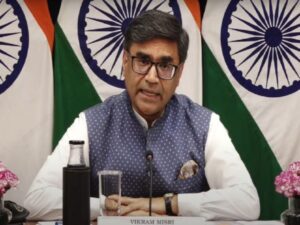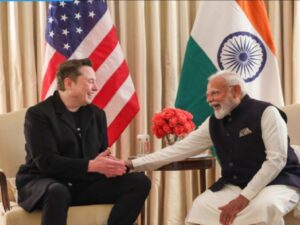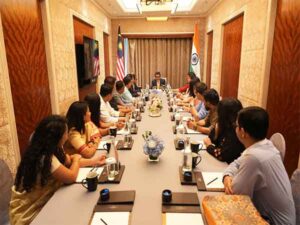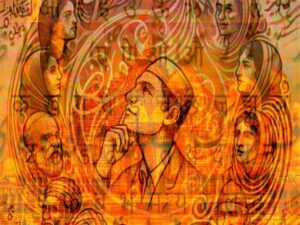Move to ban Imran Khan’s party finds little support among ruling PML-N’s allies
Islamabad, Jul 16 (PTI) The Pakistan government’s controversial move to ban jailed former prime minister Imran Khan’s Pakistan Tehreek-e-Insaf party has attracted flack from across the political spectrum with the stakeholders calling the move undemocratic, which could have far-reaching ramifications if executed.
The Pakistan government on Monday decided to ban Khan’s Pakistan Tehreek-e-Insaf (PTI) on charges of illegally receiving foreign funds, involvement in riots and alleged involvement in “anti-state” activities.
The government led by the Pakistan Muslim League-Nawaz (PML-N) party has also threatened to slap treason charges on 71-year-old Khan as well as on former president Arif Alvi, 74, among others.
Besides the PTI, which has called the move an act of “desperation” and a “sign of panic” within the federal administration, leaders from other parties including the Pakistan Peoples Party, Awami National Party, Jamiat Ulema-i-Islam, and Jamaat-i-Islami have criticised the decision.
The PPP led by former foreign minister Bilawal Bhutto Zardari has distanced itself from the controversial move, saying the party was not consulted on the move to ban the Khan-founded party.
PPP Information Secretary Shazia Atta Marri also said the party, a key ally of the Pakistan Muslim League-Nawaz (PML-N) led government in the centre, would hold consultations on the government’s decision to ban the PTI.
The decision was announced by Federal Information Minister Attaullah Tarar, who in a press conference on Monday, said the PTI and Pakistan “cannot co-exist” and the matter to ban the party would go to the federal cabinet and the Supreme Court.
The move drew a strong reaction from the PTI which in return has also demanded invoking Article 6 of the Constitution against those who undertook the unconstitutional steps even though there is a Constitution in the country.
The party also called on allies of the ruling coalition government, including the PPP and the Muttahida Qaumi Movement-Pakistan (MQM-P), to clarify their position on the move.
PPP’s Senator Sherry Rehman confirmed Marri’s remarks about not being consulted and noted that the party had no idea that such a move by the Centre would be taken, Geo News reported.
Responding to a question regarding their alliance with the PML-N, the senator acknowledged that the government’s move should not come as a surprise to them as they are allies.
“We have also worked with allies before where every step is taken with careful due consideration about its repercussions.
“I have no idea on what level this whole issue was discussed by the government,” she said.
When asked if the banning of the PTI would achieve anything, Rehman answered in the negative and said: “My personal opinion is that this won’t achieve anything […] Even though the PPP was subjected to various tactics in the past it still stands strong today.”
“I’m of the view that you can’t stop anything or anyone via ban or censorship, there are other ways to make someone mend their ways,” the PPP leader said.
The PPP’s move to distance itself from the PML-N government’s decision is significant as the party is a key ally of PM Shehbaz-led administration and enjoys a key position politically and parliamentary as none of the parties managed to secure a simple majority in the February 8 polls.
The party’s support is therefore essential to the survival of the Centre as the PTI-backed independent candidates — who emerged as the largest single group in the general elections — got a major boost via the Supreme Court ruling declaring them eligible for reserved seats.
The development has deprived the ruling coalition of a two-thirds majority in the National Assembly.
Following the ruling, PTI will become the largest party in the National Assembly as its seats will likely soar from 86 to 109 after it gains 23 reserved seats.
According to PTI leader Asad Qaiser, the party can think about a no-confidence motion against Shehbaz once it secures enough seats.
The senator’s remarks echo those voiced by other senior PPP leaders including former chairman of the Senate Mian Raza Rabbani who has opposed the government’s decision.
Former PML-N leader Shahid Khaqan Abbasi, who recently launched his political party, Awaam Pakistan, also took exception to the move.
Abbasi said the ruling coalition was not able to understand the Constitution and that it would be unwise to invoke Article 6 because the rulers would end up facing sedition charges themselves.
He warned the decision would trigger unrest in the country and said it was the same mistake which was committed by the PTI’s founding chairman Imran Khan.
He suggested Shehbaz reconsider the move as the government’s mandate was already in question.
JUI-F leader Hafiz Hamdullah criticised the decision of the government and wondered if political and economic stability would be ensured through this decision. He also asked how a government, which came to power through form 47s, could make such decisions.
Similarly, Jamaat-i-Islami also criticised the decision and made it clear that such decisions could never stand in a court of law.
Khan and hundreds of his party colleagues are being tried under multiple cases, including one under the Official Secrets Act, in connection with the May 9 violent protests by his supporters that damaged key military installations across Pakistan last year. Khan’s wife, Bushra Bibi is also in jail in connection with some alleged corruption cases.






